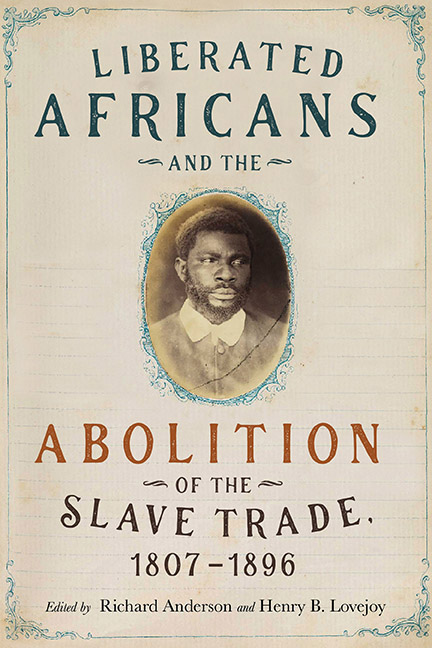Book contents
- Frontmatter
- Dedication
- Contents
- List of Illustrations
- Acknowledgments
- Introduction: “Liberated Africans” and Early International Courts of Humanitarian Effort
- Part One Origins of Liberated Africans
- Part Two Sierra Leone
- Part Three Caribbean
- Part Four Lusophone Atlantic
- Part Five Liberated Africans in Global Perspective
- Part Six Resettlements
- Bibliography
- Notes on Contributors
- Index
9 - Gavino of the Lucumi Nation: David Turnbull and the Liberated Africans of Havana
Published online by Cambridge University Press: 21 March 2020
- Frontmatter
- Dedication
- Contents
- List of Illustrations
- Acknowledgments
- Introduction: “Liberated Africans” and Early International Courts of Humanitarian Effort
- Part One Origins of Liberated Africans
- Part Two Sierra Leone
- Part Three Caribbean
- Part Four Lusophone Atlantic
- Part Five Liberated Africans in Global Perspective
- Part Six Resettlements
- Bibliography
- Notes on Contributors
- Index
Summary
In 1840 David Turnbull, British consul and superintendent of liberated Africans in Havana, presented Cuban authorities with the case of Gavino, a liberated African, or emancipado, who had been reduced to virtual slavery. Gavino was one of over ten thousand captives who had been rescued from slave ships between 1824 and 1840 and then emancipated in Cuba. Turnbull believed that Gavino could serve as a test case to illustrate the widespread abuse of the emancipados, a case so compelling that the Spanish government and his superiors in Britain would act on behalf of the thousands of emancipados who had been enslaved. Turnbull understood what members of oppressed groups “have known instinctually[,] that stories are an essential tool to their own survival and liberation.” At great personal risk to himself and his family, Gavino agreed to cooperate with Turnbull in this effort. In doing so, he inserted his own narrative into the historical record, which makes it possible to reconstruct his life story in some detail.
Thanks to the partnership he and Turnbull forged, the British pressured the Spanish government into addressing the plight of the emancipados, a campaign they carried to Brazil and other parts of the Americas as well. Gavino's case is a reminder that in Cuba, as in other parts of the Americas, the law was “an arena for social and political struggle that could be accessed by the enslaved” or in this case, by the emancipados, but here the legal battle went beyond the local courtroom and into the highest international diplomatic arenas. Their goal was not simply to sway a courtroom but to influence governments, from local officials in Havana to the highest-ranking diplomats in London and Madrid.
Gavino's Odyssey
Gavino identified himself as a member of the Lucumi nation, the term usually applied in Cuba to the Yoruba, a people who live in modern-day Nigeria. He and some companions were traveling in search of food when they stumbled into a struggle between two warring factions whose sole purpose was to capture people to sell into slavery. They were within a day’s march of a Spanish factory located up a river he called the Ossa, probably the Osse or Osun River, identified by other captives enslaved in the Americas as their homeland. He would have been in his early twenties at the time of his capture in 1824.
- Type
- Chapter
- Information
- Publisher: Boydell & BrewerPrint publication year: 2020



